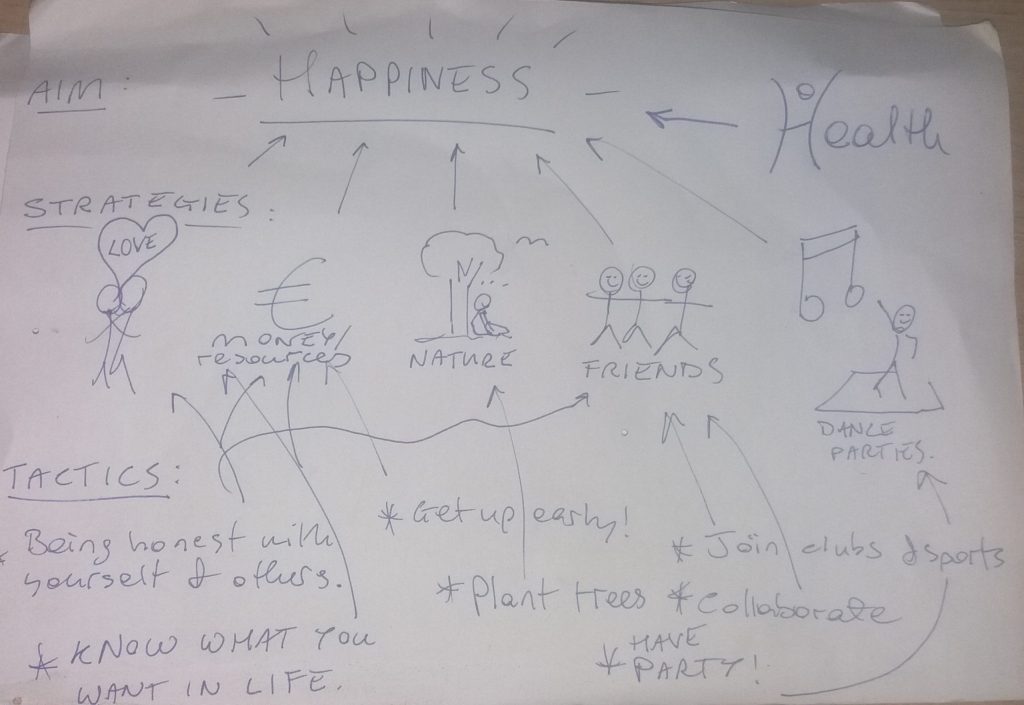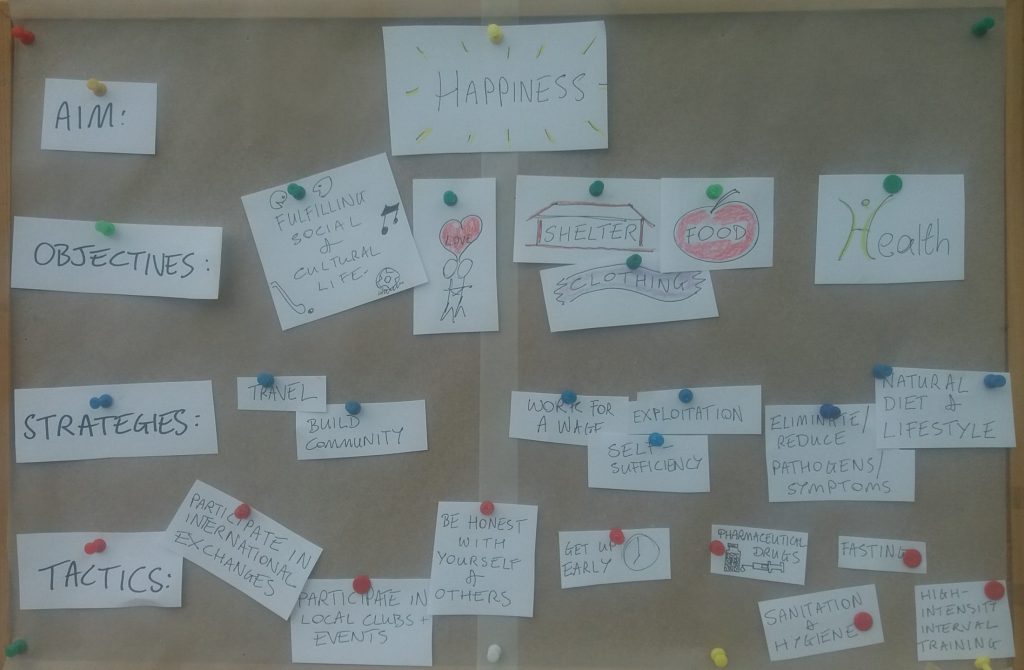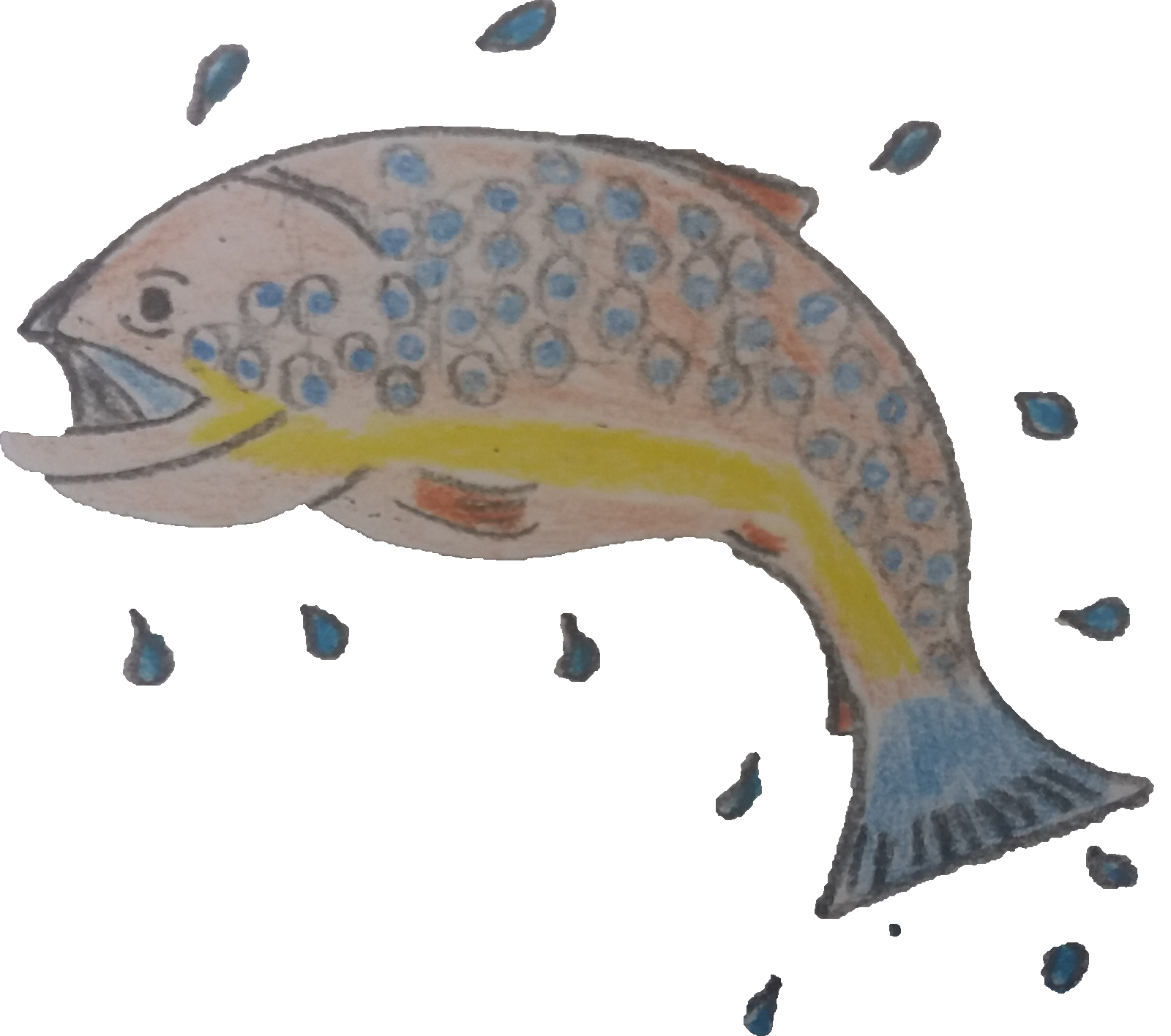What is the most important thing in your life? Is it your work that makes you happiest? Or is it hanging out with your friends that you enjoy the most? Maybe you love being in nature or maybe its music and dancing that makes you happiest. Maybe you are in a great relationship and being with that person is what makes you happy, or if you have little children then I’ll bet seeing them smile makes you happy too.
With practically every priority in life I can think of it seems the underlying motivation is the desire to be happy or contribute to the happiness of others. Even people who only seem to care about money probably imagine how happy they will be when they have accumulated enough to buy what ever it is that they want.
I think that people fighting in a campaign or revolution do what they do because they think a certain outcome would make them or their allies happy, or just doing the right thing might give them peace of mind and that would also make them happy. Future generations would probably be happy if we stop wrecking the planet – they’d surely be happier breathing clean air and drinking clean water.
Happiness Campaign
If we need all of these things and more to be happy, it could be useful to write some of them down somewhere to remember so that we don’t get off track just making money all the time, or just spending all our time in nature alone and not spending any time with other people. If I take a few of them, and roughly organise them along the lines of a campaign, breaking them into aims, strategies and tactics, it could look something like this:

The purpose of this diagram isn’t to tell you how to achieve happiness, and I think happiness and life is a journey anyway not a destination. Its just an illustration of how aims, strategies and tactics relate to each other in a hierarchy. The aim sits on top of the hierarchy and is the ultimate goal. In this example it’s happiness. Below this are strategies to help achieve the aim, and below the strategies are tactics: the actionable things you do that help achieve the strategy.
We could have another level called “Objectives” (maybe including things like a loving relationship, enough material resources, health and natural environment for example) just beneath the aim. So the four levels of the hierarchy would be “Aims” at the top, then “Objectives”, then “Strategy” and “Tactics” at the bottom.
Of course real life is much more complex – if I enjoy my work I am already happy before I ever get paid, or long before I reap the harvest of whatever I am growing. We could also list many other objectives, strategies and tactics, or use different category names, but we can probably all agree that somethings in life are more important than others.
All this hierarchy talk may sound a bit too analytical and formulaic for individual happiness, but is it too much to ask that political parties and national governments get their priorities in order?
A party for people who get up early in the morning
Getting up early can be a useful tactic if you want to get work done in order to have enough resources or money. It’s healthy, natural behaviour and a great tactic towards achieving whatever you want to do in life.
It’s such a useful tactic that when Leo Varadkar, who is a former Taoiseach of Ireland, launched his leadership candidacy for the Fine Gael party, he said that he wanted to lead a party for “people who get up early in the morning”. This statement caused some controversy at the time as it was viewed as being divisive between the employed and unemployed, but the more profound aspect went without comment: of course we can be more productive when we get up early, but producing what, exactly? Many people get up early to go to a school or job they hate or to do something terrible such as pollute the environment or commit war crimes. Isn’t it obvious that pursuing a tactic of just getting up early isn’t enough to achieve happiness ourselves, or contribute to happiness in society?
Similarly, success in one strategy or achieving just one objective is unlikely to be enough to fulfill the ultimate aim. Imagine if you got up early every morning (tactic) and were very successful in whatever enterprise you started (strategy) and were rolling in money (objective), but by absolute focus on this one objective never had any love or friends in your life. Wouldn’t that be just sad, and by definition the opposite of the happiness aim?
Gross National Happiness
I think that successful revolutionaries have really valued happiness, as happiness has often made it into the constitutions they have written that we still live by today. Having happiness written into the constitution of a country should bode very well for the people living there, as the constitution is the most important moral and legal document governing how a country should work – all other laws must follow it or else they could be deemed “unconstitutional” and get scrapped. The constitution therefore sits at the top of the legal hierarchy – everything else is subordinate.
We’ve all heard of “life, liberty and the pursuit of happiness” from the American constitution. In Bhutan happiness is the fundamental explicit goal of the government, and they even try to measure it by calculating the “Gross National Happiness” or GNH index every year. I don’t know how successful they are, or how genuinely it is being pursued, but in principle I would say they are getting their priorities right.

In the Irish Constitution the fundamental aim is “the common good” which I think is pretty close to happiness, but for some reason the main measurement talked about by successive governments here seems to be economic growth, which isn’t mentioned anywhere in the Constitution at all. Recently of course the all-important metric switched to SARS-CoV-2 cases and this year (2021) it has switched to Covid-19 vaccine roll-out statistics. Where’s the happiness? What’s going on?
How economic growth consumed happiness
I think there’s been a fundamental mistake made in the campaign of life. Material wealth – which should just be at best a minor objective – and the main strategy used in recent years for achieving it – economic growth, became all powerful. As money can be converted into lots of different things that we need such as food, housing, clothing and entertainment, it got confused with happiness. Somewhere along the way it overthrew happiness as the main aim in many people’s minds.

While industrial civilisation was expanding across the globe and it seemed as though there were ever-more resources to extract and consume, the concept of economic growth as a strategy for the objective of having enough material wealth was temporarily valid – there would be more there tomorrow than there was today. Loans could be paid back with interest and we got interest on our savings in the bank. The very concept of interest and the financial system as we know it are based on never-ending economic growth being possible.
I hope it’s becoming clear to more people however that there isn’t even enough resources in the planet to use at our current rate, never mind at an ever increasing rate. After hundreds of years of economic growth we can now see that after the benefits have been accrued and spent there are some extremely nasty unforeseen side effects associated with this strategy such as:
- The accelerating depletion of the earth’s finite natural resources, thereby impoverishing future generations
- Pollution and degradation of the air, water and soil through extractive industries and the further pollution of the environment through the transportation, packaging, marketing and end use of these products
- Wildlife loss both in quantity and diversity as we continue to expand into the last vestiges of nature on the planet
- Declining human health as we consume and pollute the very environment that we depend on
- An epidemic of lifestyle-related diseases as human-beings are turned into consumers of processed foods, TV, social media, and pharmaceutical drugs, which are all “good for the economy”.
- Anthropogenic global warming, which has the potential to cause mass species extinction, huge sea level rise in a very short time period and wipe out civilisation as we know it.
Even relegating economic growth back to its proper place as just a strategy towards the objective of attaining material wealth isn’t good enough – the concept of economic growth should be dead and buried, but old, formerly successful strategies die hard. For decades now the growth imperative – a mere outdated strategy masquerading as an aim in itself – has blocked any meaningful measures to address environmental destruction. It should be obvious by now that having clean air and water in a natural environment is a much better strategy towards happiness than destroying the very environment we wish to be happy in through the dogmatic pursuit of economic growth.

There are some important questions we must ask ourselves arising from this unfortunate history:
- How long has it taken us to understand the negative long-term consequences of an economic system based on never-ending growth?
- How difficult will it be to reverse the damage?
- Despite all of these results, how many people – including those in power – remain blindly wedded to the pursuit of economic growth?
- How would you have sounded to most people if one or two hundred years ago you had said that economic growth could end up with unintended consequences such as a catastrophic rise in sea levels?!
From jobs to jabs but still missing the point…
The mistake of allowing tactics, strategies and minor objectives usurp our ultimate aims in life being repeated again in the Covid-19 era and the focus has once again been on exclusively short term tactics. Daily economic growth statistics and reports of job creation have given way seamlessly to an intense focus on Covid-19 statistics and vaccine roll out numbers. Overall health – the objective towards which these strategies and tactics are supposed to contribute – is not worked towards or reported on in any meaningful way, and happiness – the ultimate aim – is still out of the picture as usual.
Health is not the absence of one disease
We need satisfying occupations and the necessities of life (objectives), but economic growth is not the best measure of this. We need health, but, albeit important at the moment, the metrics surrounding one particular virus and the disease it can cause is not the best measure of this either. If the SARS‑CoV‑2 virus were to vanish tomorrow we wouldn’t magically become healthy or happy – there is so much more involved.
Exercise in joined up thinking
Below is a hierarchical plan for the happiness campaign with some objectives, strategies and tactics roughly placed. In your opinion, which tactics are part of what strategy, and which strategies contribute to which objectives? Do some tactics and strategies work in the short term only or will they have long term benefits? Are there any short term or long term side-effects that could undermine – or indeed underpin, the happiness objective?

I quickly ran out of space – what other objectives, strategies and tactics would you add in and how would they relate to each other? Would you remove any of them? Do the ends justify the means, or should there be enjoyment and happiness in everyday life and actions also?
Weighing up health tactics
Being or becoming healthy is a very common objective in our pursuit of happiness. I’m generally happier when I am healthy than when I’m run-down or ill (unless of course I have become so for a very good cause).
The measures we take to address the SARS-CoV-2 virus and Covid-19 disease are important tactics in our personal and collective health strategy, which if we get right can contribute to our own happiness and “the common good”. Preventing social contact (lock-down) and widespread vaccination are currently the tactics of choice for the Irish government (and many others), but like the formerly unquestionable strategy of economic growth, are there short term and possibly long-term negative side-effects from these measures that can critically undermine the ultimate aim?
“Unknown unknowns”
One of the common short-term side effects of economic growth has been pollution. Its long term side effects however – global warming and climate change – belong to the category of “unknown unknown” side effects that regularly appear long after we have interfered with nature to attempt to fulfill a particular objective.
When I see pharmaceutical corporations and governments around the world decide it’s a good idea to mass roll-out a totally new technology to genetically manipulate some of the cells in our bodies to grow a bit of a virus then of course I am concerned about the unknown unknowns that may surface in the years, decades or centuries to come. It is the failure to think and plan in terms of centuries that has brought us to the current environmental crisis.
I have a feeling that there would have been people instinctively react against the excesses begun in the industrial revolution when it was decided to burn wood and then fossil fuels at unprecedented rates, but they were probably told to shut up as there was no scientific evidence then that it would cause any problems.
Weighing up health tactics continued
I think that social restrictions or vaccine use may be justifiably promoted and effectively used in certain situations, but they are tactics which will be more or less useful depending on the case and can certainly be done badly. My personal preference where possible is for natural health strategies and tactics over pharmaceutical and anti-social ones, but being one hundred percent for or against certain tactics regardless of how they are done and the context is one of the fundamental points I am arguing against. See earlier article “Even good things can be done badly.”
As long as the risk versus benefit is understood, and in the case of new drugs the understanding that there may be unknown medium and long term effects, for better or worse, I think it makes sense that new treatments are developed and offered on a compassionate basis to help people who are at risk of death or serious illness due to a disease. With the Covid-19 vaccines it would appear that even the medium term benefits in terms of length of immunity conferred undetermined. We should therefore be even-handed and acknowledge that whether or not there will be medium or long term negative side-effects is also unknown and what these effects may be.
The risk of death and serious illness to young and healthy people with Covid-19 appears to be much less than for the elderly and in poorer health, and the younger the people concerned the more relevance the potential long term effects of any treatment are. Despite the obvious differences in usefulness that even fully understood treatments would present to different demographics, we are getting a crop-dusting approach. I’m concerned about the lack of debate around the decision to commit people, especially those at very low risk from Covid-19, to doses of new pharmaceuticals and biotechnology products that we are still only discovering all of the potential short and medium term effects of, never mind the long term effects. While in name this is voluntary, plans to open up society and travel for the vaccinated while keeping freedoms restricted for the un-vaccinated is an undue pressure on people to take products that are still on trial.
If I were to take one of the vaccines I’d be much more comfortable doing so if the bare facts were impartially laid out including the fact that we don’t know much about medium to long term effects. Reassurances of safety from politicians during the suspension of the Astra-Zeneca vaccine while its safety was under review for example have the opposite effect intended – dogma worries me much more than ignorance.
Breaking the addiction to short term strategies and tactics
We’ve seen that under certain conditions the strategy of economic growth has in the short and medium term delivered benefits such increased material wealth for humans. We’ve also seen that it’s a mistake to deem such a strategy, however powerful, as infallible for all time and all situations.
The tactic of pharmaceutical use against particular diseases has been very effective, but even the best and safest pharmaceuticals will have side-effects.
Both in how we provide for our basic necessities and how we care for our health, we need a complete reorientation of our choice of tactics away from short-term quick-fixes towards holistic tactics that improve all outcomes. To become sustainable in providing for our basic needs we need to stop mining the earth’s assets and shrink our needs to within the earth’s annual renewable income of energy and biological growth. We can both reduce what we need and maximise the renewable income by using appropriate technology and good design, but more fundamentally we need depose growth and interest from their central position in the economic system. Just as we have been mining and polluting the earth we have also been eating away at our budget of health and polluting our bodies. To me its clear that the greatest improvements that can be made now in health are by primarily focusing on holistic health tactics.
Would you like to suffer now or later?
Let’s consider some of the potential tactics we could use to fulfill a health strategy (to contribute to the aim of happiness, of course): lockdown, pharmaceutical drugs, eating a natural diet, natural lifestyle, getting fresh air and sunshine, moving out from home as a young person to develop your individuality and mental health, traveling to help broaden our minds, vacation, high intensity interval training, fasting, intermittent fasting, meeting and socialising with other people, sharing meals, participating in and forming the social and cultural life of society, dancing, sports, going to the beach, collaborating with other people, fulfilling work, falling in love, sex and intimacy, pro-creation, reducing air pollution.
Looking at the list of examples above we can broadly divide it into two categories – short term tactics that can reduce a particular disease but may have negative side effects, and holistic tactics that in normal circumstances improve every aspect of health in the medium to long term. (There are also some positive side effects thrown in there at the end).
I don’t think it make sense to pursue the short term tactics exclusively for over a year and take the negative side-effects both now and storing them up for the future, while undermining the holistic tactics and positive side-effects that contribute to all aspects of health and therefore resilience towards illness in general.
There is another way to divide these tactics. In the very short term, one group is easy and one is hard, and in the long term the opposite is true.
At the start, lockdown is easy – just stay in bed. What could be easier? Similarly taking a pharmaceutical drug is easy. Just put out your arm or swallow a pill – simple right? Whereas at the beginning there is nothing easy about doing high intensity interval training. It hurts the lungs and pushes the body to the limits. But it only lasts a few minutes and the hormonal benefits are long lasting and the body builds itself back better. Similarly fasting is hard. Its uncomfortable to be hungry for a while, but the benefits of autophagy, detoxification, rebuilt immunity and development of character more than outweigh the short term discomfort. The sharing, compromising and baring of your true self needed for forming real relationships can be uncomfortable at the start – again it’s much easier in the short term just to stay in bed and watch movies about other people living instead. I’ve been influenced in this thinking by a great article on choosing how to suffer by Mark Mason.
These dichotomies have always existed. What’s good for us in the long term is usually harder in the short term than the magic bullet, the shot in the arm, the fast food and the sugar rushes. Sometimes in an emergency we need the quick fix, but if it can be avoided, I think it’s unhealthy to make a habit of it.
Developing a health strategy that contributes to happiness
What would society be like if we truly recognised happiness as the most important thing in life, and recognised health as a vital objective towards that aim? What activities and services would be considered essential in the various pandemic lock-downs? If proximity to other humans – especially indoors – is unsafe, why is it essential that we have unrestricted access to buy alcohol, sugar and the processed foods that undermine our health in the first place, while meeting up for a health-giving game of tennis is illegal? Would the interminable draconian social restrictions that made many of us unhappy and unhealthy be permitted to last for over a year as has been the case in Ireland? The sad irony of the surge to the supermarkets, panic buying and comfort consumption is that the opposite would have been much healthier: fasting and intermittent fasting has been proven (yes, scientifically) to naturally rebuild damaged immunity.
By now I hope it’s clear that I’m not saying we should just do whatever we want all the time, individually or as a society. Every choice involves suffering of some kind, now or later, that ultimately improves us or ultimately wears us down. I think that we need to make more choices for the strategic useful short term suffering that makes us stronger.
Very quickly of course that useful suffering can start to become a sacred ritual or a challenge to relish. It’s the happiness written all over the face of the cyclist struggling up a hill in the rain, the soccer player out of breath on the ground and the lover who has bared his soul. And if there can be happiness in everyday challenges then its no longer just a distant goal to be reached after achieving a series of objectives, but a habit that we can get better at if we try.
So, what are the most important things in your life? How would you like to work towards them?


A brilliant summary of the current situation! I agree wholeheartedly with what your saying Paul. This whole ‘pandemic’ has highlighted how dusfunctional, society has become due to a lack of focus on our fundamental needs.. Both as a product of education and a misleading focus on economic growth… Although the idea of happiness leaves a great deal of room for interpretation i agree that the idea of sustained ‘happiness’ could sum that up.
Hi Peter thanks for the kind words : )
I think “dysfunctional” is a fair way to describe contemporary society alright, and mandating that we become even more pharmaceutical-dependent and anti-social as the main tactics for our cure falls short of the mark for me.
Its definitely not a summary however as I think that there is so much more to discuss.
Thanks for reading and see you soon : )